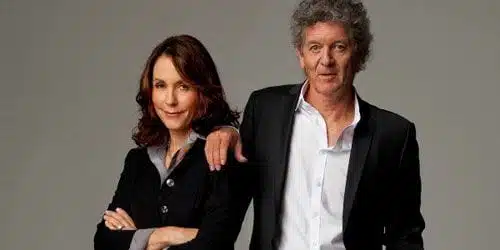
On paper, Kin: Songs By Mary Karr & Rodney Crowell has the makings of a classic. Karr is an acclaimed poet and a bestselling memoirist, known in both genres for an earthy, plainspoken lyricism. Her book The Liar’s Club, about her emotionally desolate childhood in east Texas, is a classic of the genre. Crowell is a Grammy-winning singer, songwriter, and producer whose work straddles the fence between traditional country and Americana and he published his own memoir about his own hardscrabble east Texas childhood, Chinaberry Sidewalks, last year. Add in the talents of producer Joe Henry and vocalists Norah Jones, Emmylou Harris, Lucinda Williams, Vince Gill, Leanne Womack, Kris Kristofferson, and Crowell’s ex-wife Rosanne Cash, and you’ve got a cross between a Grand Ole Opry superjam and a meeting of the Nashville equivalent of the Algonquin Round Table.
So the first question one has to ask is, does Kin live up to its potential? More particularly, do Karr’s literary chops translate into artful songwriting? Does the all-star cast add to the overall effect or distract from the idea of a coherent concept album about family relationships? The answer to the first two questions is yes. The third one is more complicated. To start with, Crowell has a serviceable country-rock voice, but he’s not the world’s most expressive singer. He writes a mean song, but his vocals are low key and tend to skim along the surface rather than dig into the emotional depths of his lyrics. That’s fine when the songs call for deadpan understatement or tough guy machismo, but too many of these songs cut too deep for his vocal talents, and of course many of them are told from a female point of view. But, as with any album filled with superstar cameos, the ever changing cast of vocalists sometimes draws attention away from the songs. By the time we’re accustomed to the latest singer, the song is over.
Still, that’s a small complaint when measured against the bounty Kin offers, particularly on repeated listens. The opening track, “Anything But Tame”, is classic Crowell, a nostalgic but measured reminiscence of young love set to a solid country-rock backbeat. The second track, “If the Law Don’t Want You”, might be about the same girl, a few years older and told from her own point of view, as she rattles off the bad boy prerequisites she’s looking for in a man: “If you ain’t running from the past / You ain’t making my heart beat fast / You ain’t chugging your paycheck / You ain’t hugging on my neck”, before concluding, “If the law don’t want you, neither do I.” Norah Jones’s vocal is heartstopping, and Emmylou Harris’s harmonies are as heartfelt as we’ve come to expect from her.
Even better is “God I’m Missing You”. Once again, it could be the same woman, older now and played by Lucinda Williams, this time looking back on the damage one of her bad boys has done: “I heard a siren and you came to mind / You were the pretty part of us / I’m what’s left behind.” Williams’ performance is as heartbreaking as anything on her own albums, but this is where I started to wonder why Crowell and Karr chose to have different women sing each of the album’s female songs. Does it serve an aesthetic end, a commercial one, or was it just impractical to find one female vocalist who would commit to the whole album? In the end it doesn’t really matter: only fools and critics worry about the records the artists didn’t make.
The songs more or less bounce back and forth between the men and women, and as the album moves on a pattern becomes clear: the fathers, brothers, and husbands are all failures of one sort or another (summed up nicely by Crowell in “I’m a Mess”), while the women are the victims left in their wake. The credits don’t specify who wrote what, but it seems safe to guess that the former were mostly written by Crowell and the latter by Karr. At any rate, the him-songs fit neatly alongside the autobiographical gems on his best albums like The Houston Kid and The Outsider. But the her-songs are the ones that really resonate. Karr implies in her liner notes that she’s not much of a singer, but she has the songwriter part of the equation down pat.

